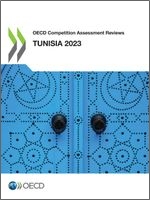Competition
Fostering competition in Tunisia
Background and general framework of the projectThe Tunisian economy has been resilient in the last few years. The standard of living of Tunisians has improved and the poverty rate has declined over the past decades. The COVID-19 pandemic and consequent economic crisis has deeply affected tourism, industrial activity and exports and resulted in an unprecedented real GDP contraction of 8.8% in 2020. Economic activity may return to pre-pandemic levels no sooner than late-2023. In the context of the European Union’s "Programme d'Appui à la Gouvernance Economique” the Government of Tunisia wishes to improve the national business climate and revive business investment as part of a post-COVID recovery plan. The OECD has been asked to contribute to this effort and share its extensive experience in pro-competitive reforms to identify restrictions and provide recommendations that aim at increasing consumer’s welfare and economic growth. The project started in February 2021 and builds on the success of the first OECD Competition Assessment ever conducted in the country in 2019, which covered two important sectors of the economy: wholesale and retail trade as well as road and maritime freight transport. In co-operation with Tunisia, the OECD conducted a peer review of competition law and policy in 2021, a Competition Assessment Review of Tunisia's tourism sector in 2023 and a Market Study of Tunisia's Retail Banking Sector also in 2023. The OECD has held extensive consultations with the Tunisian administration and other stakeholders to tailor the analysis and the recommendations of these reviews to the Tunisian reality. The work was complemented by workshops to build the capacity of Tunisian officials to conduct competition assessments, in line with international best practices. The essential role of competitionIncreased competition can improve a country’s economic performance, open business opportunities and reduce the cost of goods and services to the benefit of consumers. Although laws and regulations are necessary for the well functioning of our societies and economies, in some cases they can restrict competition, preventing the said benefits from taking place. Competition assessment is the process of identifying restrictive regulations and developing alternative, less restrictive measures that still achieve government policy objectives. This exercise could significantly reduce unnecessary restrictions and contribute to continued and sustained growth. |
CONTACT For queries about the project and to provide input please contact Said.KECHIDA@oecd.org |
Why a competition assessment of the tourism sector
|
OECD Competition Assessment Reviews: Tunisia 2023 Publication date: 06/06/2023 |
The Government of Tunisia, the European Union and the OECD have decided to conduct a competition assessment of the tourism sector given its importance for the economy, especially from a post-COVID perspective. Tourism has historically played a central role in the Tunisian economy. As one of the largest contributing sectors to GDP and employment, tourism is a major contributor to foreign currency reserves. The consequences of the COVID-19 pandemic on the sector are being considered as severe with about a 60% drop in earnings in 2020. Preparing the sector for potential recovery and enabling it to reach its full potential, including removing barriers that may hinder the competitive and efficient functioning of the industry is the main objective of the Tunisian authorities. A competition assessment will help identify restrictive regulations in the sector and develop alternative, less restrictive measures that still achieve government policy objectives, contributing to continued and sustained growth. This assessment, made based on the OECD Competition Assessment Toolkit was launched during the first edition of the competition day, an event co-oganised by the OECD, GIZ and the EU delegation in Tunisia in collaboration with the Tunisian Competition Council. Access the report l Highlights brochure l Read the press release l Download the agenda (in French) |
Why a market study of the banking sector
|
Competition Market Study of Tunisia's Retail Banking Sector Publication date: 14/12/2023 |
Banks are the cornerstone of the Tunisian financial system where they account for more than 90% of intermediated financing. On the other hand, the share of bank credit in GDP is still low by regional and international standards and access to finance was one of the main obstacles identified by Tunisian businesses across several recent surveys (WEF, 2017/ WB 2014). A market studies of the sector, based on the OECD's Market Studies Guide for Competition Authorities, helped assess the effectiveness of competition and propose recommendations to address them with the objective of supporting better outcomes for consumers in terms of innovation and prices, and fostering long-lasting growth. The 2023 market study provides an assessment of competition in three broad areas of the retail banking sector in Tunisia: current accounts, bank loans for micro, small and medium enterprises and mobile payment services. The report identifies areas where competition is not working as well as it could, reducing customers mobility and access to finance and limiting the competitive pressure that fintech companies can exert on traditional banks. The report provides a range of recommendations to improve market outcomes for financial services users and it includes estimates of the expected impact of the implementation of the recommendations on the economy. Read the highlights brochure: English l French l Arabic See pictures of the launch event 
|
|
DOCUMENTS & LINKS
OECD Peer Reviews of Competition Law and Policy: Tunisia Competition Assessment Toolkit Market Studies Guide for Competition Authorities
2021 Project Launch Press Release (French, pdf) |
|
||||||||||||||||
Related Documents




